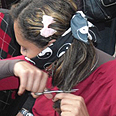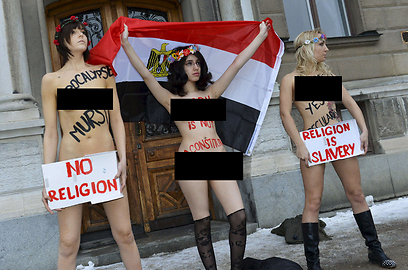
Arab women highlight of grim year, columnist says
Past year was fraught with bloodshed and oppression but Arab women fought for better future, Lebanese journalist writes
Taking stock of the past year's events, a Lebanese journalist has branded 2012 as the "year of the Arab woman," asserting that the determination of women across the Arab world was a bright spot amid a period fraught with bloodshed and oppression.
"If the hope for 2012 was to set the track for the future, it failed miserably to do so," Octavia Nasr wrote in a column that was published by the Lebanese newspaper An-Nahar last week.
Related stories:
- Egypt blogger strips naked to protest constitution
- Haredi women threaten not to vote
- Arab soldier hides service from neighbors
"Instead, it highlighted the differences, widened the gaps and brought to the surface some of the dangers lurking ahead.
"(...) In the midst of this grim state of affairs, there were many shining moments this year that deserve to be singled out and applauded. They belong to Arab women who appeared early in the year to be the biggest losers of the Arab awakening."
In her piece, Nasr mentioned Haifa Mansour, the first Saudi female filmmaker to direct an entire movie inside Saudi Arabia. The film, which took her five years to complete, tells the story of a 10-year-old Riyadh girl who wants a bicycle. She is determined to make her dream come true, which is particularly difficult in a society that regards bicycles as degrading for women.
With hopes of blocking the movie project, authorities barred Mansour from being present at the site of the filming, and so she resorted to directing parts of the film remotely, using walkie-talkies.
Nasr also told about Houda al-Habash, a preacher who taught at an Islamic school for girls at Al-Zahra Mosque in Damascus for three decades. Habash helped women understand their rights within Islam. Habash and her family fled the civil war in Syria earlier this year but continued to speak about the importance of empowering women as a key to any successful society.
Turning her attention to Egypt, Nasr lauded a young blogger, Aliaa Magda Elmahdy, who posted naked photos of herself on her website in protest against the Islamist rule in her country. The death threats that ensued caused her to flee Egypt and seek asylum in Sweden, where she recently resumed her protest efforts with a nude photo-op outside her country's embassy. A slogan painted on her naked body read "Sharia isn't a constitution."
Female rising stars were big in the social media in 2012, and that doesn't get past Nasr. The journalist told of three young women from Lebanon, the Palestinian Authority and Egypt, who launched a Facebook campaign titled "The Uprising of Women in the Arab World." Their initiative garnered much public support, measured in over 85,000 Facebook "likes."

Elmahdy in Stockholm (Photo: AFP)
"All of those cases are symbolic acts of defiance, revolutions in and by themselves, born in a moment of truth with oneself," Nasr wrote.
"When the weight of patriarchal rules suffocates a woman’s last breath, a rebellion begins. Nothing can stop it before the Arab female makes her point in her own way… 2012 was just the beginning of a challenging road ahead."
Several reports that support Nasr's claim surfaced over the past few days. An Egyptian lawyer has threatened to sue a female illustrator because one of her caricature is offensive to Islam, he claimed.

'Offensive' caricature
The drawing shows an "angel" telling the biblical Adam and Eve that if they don't vote in favor of the country's contested constitution, they will be kicked out of the Garden of Eden.
The caricaturist, Doaa Eladl, said she drew inspiration from clerics who told Egyptians that voting for the constitution would pave their way to heaven, while voting against it would lead them to hell.
In another move meant to protest the Islamist-backed constitution and its oppressive attitude towards women, activists in Cairo's Tahrir Square publically cut their hair.
“Freedom costs a fortune. It’s not our hair which crowns us women; our freedom does,” Fatma Al-Sharif, one of the protest's organizers, was quoted as saying by the Egypt Daily News.
- Follow Ynetnews on Facebook and Twitter
- Receive Ynetnews updates directly to your desktop










